Montreal Royals
|
Montreal Royals 1896–1960 Montreal, Quebec | |||
| |||
| Class-level | |||
|---|---|---|---|
| Previous |
| ||
| Minor league affiliations | |||
| League | International League (1928–1960) | ||
Previous leagues |
| ||
| Major league affiliations | |||
| Previous |
| ||
| Minor league titles | |||
| League titles | 9 (1898, 1922, 1941, 1946, 1948, 1949, 1953, 1958) | ||
| Team data | |||
Previous parks | Delorimier Downs | ||
The Montreal Royals were a minor league professional baseball team in Montreal, Quebec, from 1897–1917 and 1928–60. A member of the International League, the Royals were the top farm club (Class AAA) of the Brooklyn Dodgers from 1939; pioneering African-American player Jackie Robinson was a member for the 1946 season.
History
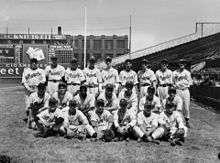
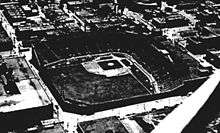
In 1928, George Stallings, a former Major League Baseball executive and Southern United States planter, formed a partnership with Montreal lawyer and politician Athanase David and businessman Ernest Savard to resurrect the Montreal Royals. Among the team's other local affluent notables were close friends Lucien Beauregard, Romeo Gauvreau, Hector H. Racine, and Charles E. Trudeau. Trudeau, businessman and father of future Prime Minister of Canada Pierre Trudeau, would remain on the Montreal Baseball Club Inc. Board of Directors until his death in 1935.[3] Together these men financed and built Delorimier Stadium (also known as Montreal Stadium, Hector Racine Stadium and Delorimier Downs) [4] at Delorimier Avenue and Ontario Street in east-end Montreal to serve as the team's home field. This version of the Montreal Royals enjoyed great success and launched the baseball careers of Sparky Anderson, Gene Mauch, Roberto Clemente and the man who broke Major League Baseball's color barrier with Montreal in 1946, Jackie Robinson. Other Royals' players of note include Duke Snider, Don Drysdale, Chuck Connors, Walter Alston, Roy Campanella, Johnny Podres and the winningest pitcher in the history of the team, Tommy Lasorda.[5]
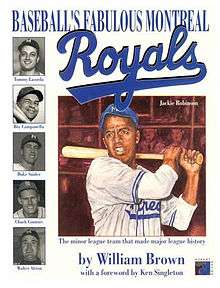
The team holds a unique place in baseball history for being the first major-league affiliate to break the so-called "baseball color barrier". On October 23, 1945, two members of the Brooklyn National League Baseball Club Inc. Board of Directors, Montreal Royals owner and team president, Hector Racine, and Brooklyn Dodgers general manager, Branch Rickey, signed Jackie Robinson, an African-American.[6][7] Robinson played with the Royals during the 1946 season. John Wright and Roy Partlow, black pitchers, also played with the Royals that year.[8]
During that season, Robinson faced the race-related resistance from his manager, Mississippian Clay Hopper, and teammates but soon won them over with his masterful play (beginning with his spectacular debut in the opening game against the Jersey City Giants) and courage facing hostile crowds and opponents. As for his home city, he was welcomed immediately by the public, who followed his performance that season with intense adoration. For the rest of his life, Robinson remained grateful to the people of Montreal for making the city a welcoming oasis for him and his wife during that difficult 1946 season. They lived in an apartment in a white neighborhood of Montreal that summer.[9]
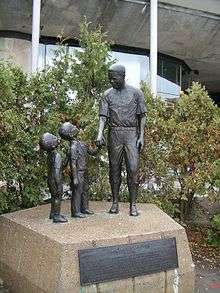
Robinson then left to play for the Dodgers the following year, but not before winning the Little World series and being chased by exultant Montreal fans right to the train as he left. In Ken Burns' documentary film Baseball, the narrator quotes Sam Maltin, a stringer for the Pittsburgh Courier: "It was probably the only day in history that a black man ran from a white mob with love instead of lynching on its mind."
The Royals continued through the 1960 season. On September 13, 1960 Dodgers President Walter O'Malley announced that due to weak attendance, the Dodgers were ending their affiliation with the team. While a new affiliation with the Minnesota Twins was arranged, efforts to keep the team in Montreal failed, and the franchise was relocated to Syracuse, New York for 1961, where it has played as the Syracuse Chiefs since. Montreal would gain an MLB team, the Expos, in 1969.
Titles
The Royals won the Governors' Cup, the championship of the IL, 7 times, and played in the championship series 11 times. For more details on their playoff history, please see Montreal Royals Accomplishments
Montreal Royals records
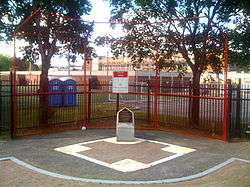
| Year | Wins | Losses | Percentage | Finish |
|---|---|---|---|---|
| 1897 | 49 | 76 | .392 | 7th |
| 1898 | 68 | 48 | .586 | 1st |
| 1899 | 62 | 51 | .549 | 2nd |
| 1900 | 54 | 72 | .429 | 7th |
| 1901 | 65 | 67 | .492 | 6th |
| 1902 | 59 | 77 | .434 | 6th |
| 1903 | 37 | 95 | .280 | 7th |
| 1904 | 67 | 62 | .519 | 5th |
| 1905 | 56 | 80 | .412 | 6th |
| 1906 | 57 | 83 | .407 | 7th |
| 1907 | 46 | 85 | .351 | 8th |
| 1908 | 64 | 75 | .461 | 5th |
| 1909 | 68 | 83 | .450 | 6th |
| 1910 | 71 | 80 | .470 | 5th |
| 1911 | 72 | 80 | .474 | 5th |
| 1912 | 71 | 81 | .467 | 6th |
| 1913 | 74 | 77 | .490 | 5th |
| 1914 | 60 | 89 | .403 | 7th |
| 1915 | 67 | 70 | .489 | 5th |
| 1916 | 75 | 64 | .539 | 3rd |
| 1917 | 56 | 94 | .373 | 7th |
| 1928 | 84 | 84 | .500 | 5th |
| 1929 | 88 | 79 | .527 | 4th |
| 1930 | 96 | 72 | .571 | 3rd |
| 1931 | 85 | 80 | .515 | 4th |
| 1932 | 90 | 78 | .536 | 4th |
| 1933 | 81 | 84 | .490 | 6th |
| 1934 | 73 | 77 | .487 | 6th |
| 1935 | 92 | 62 | .597 | 1st |
| 1936 | 71 | 81 | .467 | 6th |
| 1937 | 82 | 67 | .550 | 2nd |
| 1938 | 69 | 84 | .451 | 6th |
| 1939 | 64 | 88 | .421 | 7th |
| 1940 | 80 | 80 | .500 | 5th |
| 1941 | 90 | 64 | .584 | 2nd |
| 1942 | 82 | 71 | .536 | 2nd |
| 1943 | 76 | 76 | .500 | 4th |
| 1944 | 73 | 80 | .477 | 6th |
| 1945 | 95 | 58 | .621 | 1st |
| 1946 | 100 | 54 | .649 | 1st |
| 1947 | 93 | 60 | .608 | 2nd |
| 1948 | 94 | 59 | .614 | 1st |
| 1949 | 84 | 70 | .545 | 3rd |
| 1950 | 86 | 67 | .562 | 2nd |
| 1951 | 95 | 59 | .617 | 1st |
| 1952 | 95 | 56 | .629 | 1st |
| 1953 | 89 | 63 | 586 | 2nd |
| 1954 | 88 | 66 | .571 | 2nd |
| 1955 | 95 | 59 | .617 | 1st |
| 1956 | 80 | 72 | .526 | 4th |
| 1957 | 68 | 86 | .442 | 8th |
| 1958 | 90 | 63 | .588 | 1st |
| 1959 | 72 | 82 | .468 | 6th |
| 1960 | 62 | 92 | .403 | 8th |
Montreal Royals managers
| Year(s) | Name |
|---|---|
| 1897 | George Weidman |
| 1897–1902 | Charles Dooley |
| 1903 | Gene DeMontreville |
| 1904 | Charlie Atherton |
| 1904 | Ed Barrow |
| 1905–1906 | James Bannon |
| 1906–1907 | Malachi Kittridge |
| 1907 | James Morgan |
| 1908–1909 | Doc Casey |
| 1910 | Ed Barrow |
| 1911 | Edward J. McCafferty |
| 1912 | Billy Lush |
| 1912–1914 | Kitty Bransfield |
| 1914–1917 | Dan Howley |
| 1928 | George Stallings |
| 1928–1932 | Ed Holly |
| 1932–1933 | Doc Gautreau |
| 1933–1934 | Oscar Roettger |
| 1934–1936 | Frank Shaughnessy |
| 1936 | Harry Smythe |
| 1937–1938 | Walter "Rabbit" Maranville |
| 1938 | Alex Hooks |
| 1939 | Burleigh Grimes |
| 1940–1942 | Clyde Sukeforth |
| 1943 | Fresco Thompson |
| 1944–1945 | Bruno Betzel |
| 1946–1949 | Clay Hopper |
| 1950–1953 | Walter Alston |
| 1954 | Max Macon |
| 1955–1957 | Greg Mulleavy |
| 1957 | Al Campanis |
| 1957 | Al Ronning |
| 1957 | Tommy Holmes |
| 1958–1960 | Clay Bryant |
Notable former players
- George Gibson (baseball) – Major League Baseball Catcher and Manager
- Goody Rosen – Major League Baseball All-Star outfielder
- Jackie Robinson – Major League Hall of Famer
- Tommy Lasorda – Major League Hall of Famer
- Roberto Clemente – Major League Hall of Famer
References
Notes
- ↑ "1938 Montreal Royals". Baseball Reference. Retrieved November 23, 2015.
- ↑ "1937 Montreal Royals". Baseball Reference. Retrieved November 23, 2015.
- ↑ "Canadian Broadcasting Corporation : Charles Trudeau ownership". CBC News.
- ↑ Baseball Reference: Delorimier Downs
- ↑ http://www.hour.ca/news/news.aspx?iIDArticle=9381
- ↑ General Baseball History: Baseball's Negro Leagues
- ↑ Society for American Baseball Research: Quebec
- ↑ Hill, Benjamin (2007-02-14). "Forgotten members of the 'great experiment': Roy Partlow, John Wright lost in Dodgers' 1946 Minor League integration". Minor League Baseball. Retrieved 2009-03-17.
- ↑ "US to honor Robinson's Montreal home". FOXSports.com. Associated Press. February 27, 2011. Retrieved 2011-02-27.
... the apartment the couple called home in the summer of 1946.
Sources
- Brown, William (foreword by Ken Singleton) Baseball's Fabulous Montreal Royals (1996) Robert Davies Publishing ISBN 1-895854-64-4
